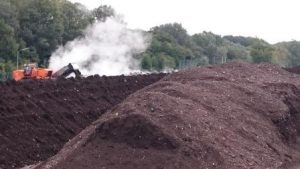 Experience in countries with established bio-waste recycling shows that the first and preferred option for bio-waste recycling shall be compost production. Compost production is relatively easy and cost-effective to implement at local, regional or supra regional level. Compost production can go hand in hand with production of biogas, i.e. via processes of anaerobic digestion, if organic material with high biogas-potential is available. This could increase the economic value generated per tonne of bio-waste.
Experience in countries with established bio-waste recycling shows that the first and preferred option for bio-waste recycling shall be compost production. Compost production is relatively easy and cost-effective to implement at local, regional or supra regional level. Compost production can go hand in hand with production of biogas, i.e. via processes of anaerobic digestion, if organic material with high biogas-potential is available. This could increase the economic value generated per tonne of bio-waste.
Once a composting and anaerobic digestion infrastructure has been established, this provides a solid basis of bio-waste management, to which novel technologies can be coupled. Examples include biorefinery processes in which bio-waste serves as a source of bio-based chemicals, fibres and nutrients.
In future biorefinery and other technologies could be developed in conjunction with existing composting and anaerobic digestion infrastructure. This is necessarily as only a limited percentage of heterogeneous bio-waste will technically be suitable for the production of high value products such as bioplastics, biochemical and bio-based materials. The remaining part of organic residues respectively will still be turned into compost and digestate products, thus closing biological cycles and improving soil quality and health.
Bio-Waste contributes to EU Circular Economy objectives
Recycling of bio-waste contributes significantly to circular economy objectives:
- It closes biological material cycles, and reduces the linear economy of landfilling and incineration of bio-waste.
- It contributes to long term soil fertility and C-sequestration by production of quality soil improvers and organic fertilisers.
- It produces bio-based products which can replace fossil-based products such as mineral fertilisers, peat and fossil fuels.
- It creates a local economy with sustained jobs. Based on experience in countries with established bio-waste recycling infrastructure, additional recycling of 100 Mio tonnes would lead to approx. 20,000 jobs. In addition, it contributes to improving farmers’ incomes and to distributed jobs in rural regions.
- It contributes to climate change mitigation, by replacing of fossil energy and fuel, peat and mineral fertilisers, sequestration of carbon in soil and by avoided landfill gas emissions.
- Separating of bio-waste from the residual waste also enables increased recycling rates of other waste materials (glass, plastics, paper and metals).
